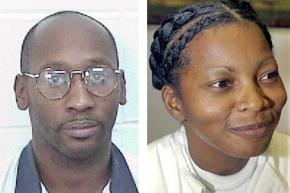We can’t let them repeat history
, national director of the Campaign to End the Death Penalty, explains what's at stake in the case of Troy Davis.
MY "TROY Davis: Innocent" T-shirt hangs in my closet next to my "Frances Newton: Innocent" T-shirt. I'm frightened that they could soon have more than their innocence in common. If the state of Georgia gets its way, Troy Davis will be executed on September 23, and both will be victims of America's machinery of death.
In 2005, the state of Texas got away with killing Frances, despite compelling evidence of her innocence.
It's surreal how the justice system works in this country. Frances did not have a decent lawyer, she didn't have money, and she was Black. Those are all factors that turn out to be much more important than anything else--including the heinousness of the alleged crime--in determining which defendants get sentenced to death, and which don't.
I read recently that Antonin Scalia, the conservative Supreme Court justice, said good lawyers are essential to justice because "we rely on lawyers to present the facts." But what if your lawyers don't have enough money to do a proper investigation to dig out the facts? What if the facts never get presented at your original trial? What if your lawyer is so incompetent and disinterested that he doesn't present much of anything?

That was the case with Frances Newton. By the time she did have decent lawyers who could present the facts to prove her innocence, the courts wouldn't look at them--because it was too late under the law to make appeals.
Frances was worried as she went to trial because she had hardly ever talked to her court-appointed lawyer, Ron Mock. She had good reason to be worried. Mock's preparation for her trial was nonexistent--he filed no motions, failed to submit a subpoena list and interviewed no witnesses.
Frances' family scraped together enough money to hire a lawyer, and they petitioned the judge to change attorneys. In a fairly unusual move, the judge held a hearing where lawyer David Eisen questioned Mock on the witness stand. Eisen asked Mock, "Can you give me the name of any witnesses, either state or defense witnesses in this case, that you have talked to?" Mock replied, "Not off the top of my head. No, I can't."
Appallingly, the judge rejected Frances' request for a new attorney, and she was stuck with Mock. Shortly before Frances was executed, Eisen said, "I was shocked she never got a new trial. I thought it was a clear case of ineffective assistance of counsel."
NOW IT feels like we're reliving history. Troy Davis could be executed on September 23 by the state of Georgia--even though there is compelling evidence of his innocence that has never been heard by a jury.
Troy, who is also African American, was sentenced to die for the murder of a white police officer in Savannah, Ga. No physical evidence ever connected him to the crime. He was convicted because nine witnesses testified at his trial that he was the shooter. But now, seven of these nine witnesses have recanted. Some of have said in written affidavits that they were pressured by police to finger Troy.
But the courts have so far denied Troy the ability to present this persuasive evidence to a jury. And on September 12, the Georgia Board of Pardons and Paroles denied clemency to Troy. Now his case is before the U.S. Supreme Court, though the justices aren't scheduled to hear arguments on the appeal until after his current execution date.
If justice means anything, the Supreme Court will recognize this travesty for what it is, and grant Troy a new trial.
Frances and Troy share a number of similarities. Both spent almost 20 years on death row. Both received stays within hours of their first scheduled executions. Both had poor lawyers at their trials, both are African American, and both are from Southern states. Frances, like Troy didn't confess. She also had strong evidence of innocence, which a court never heard.
The difference, I hope, is that we can make enough noise in the days before Troy's scheduled execution to compel the Supreme Court to do the right thing--the very thing they didn't do for Frances.
On September 11, an impressive 1,000 people rallied for Troy in Atlanta. Thousands of people from around the world have written, called and faxed messages of support for Troy. Two rallies took place on September 18--one in Atlanta and on in Washington D.C. Another demonstration will take place on the steps of the U.S. Supreme Court.
Unfortunately, we weren't as organized in our response for Frances. In a few days, we will learn if we mustered enough pressure to save Troy.
I know that Frances would not want me to hang my Troy T-shirt next to hers in defeat. She would hope that, as a society, we had moved further away from the death penalty. And I know she would hope that her "Frances Newton: Innocent" shirt would remain a symbol of terrible injustices that were now firmly a part of the past.


